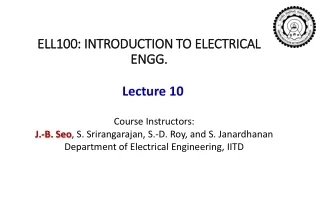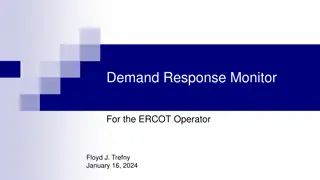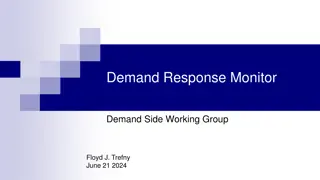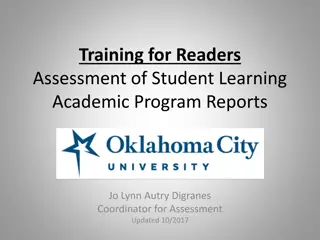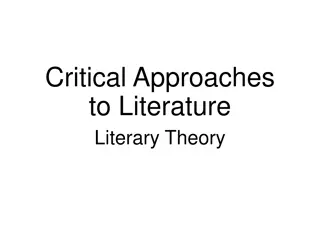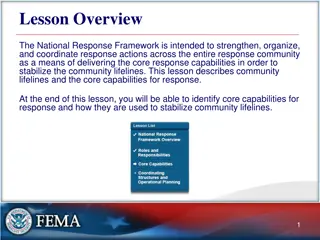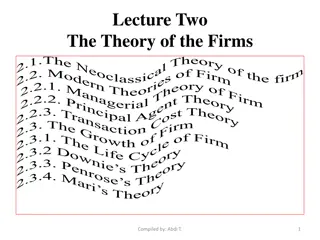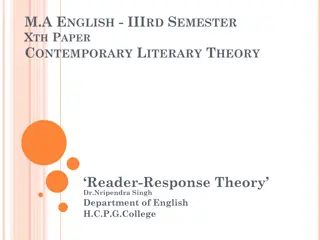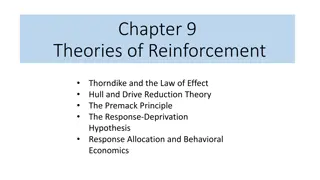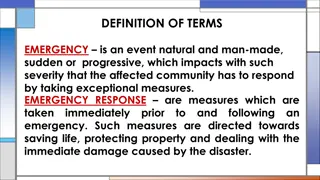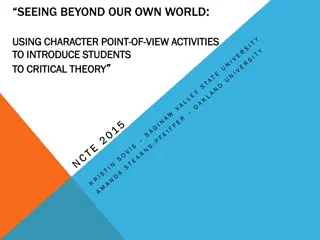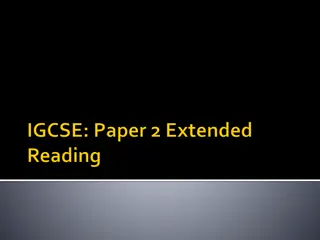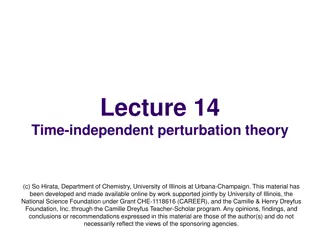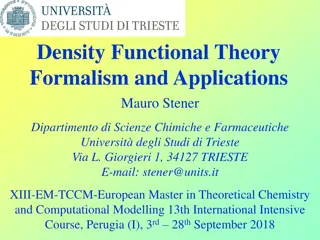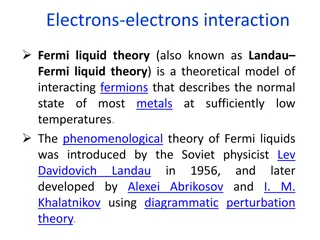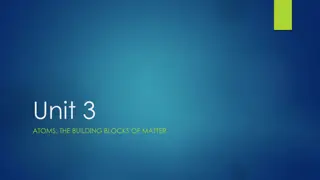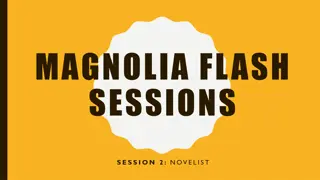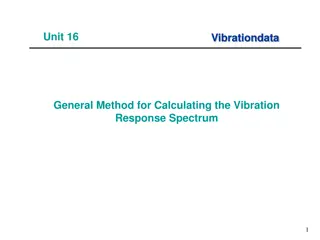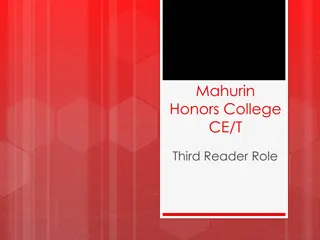Introduction to Electrical Engineering: Complete Response
Introduction to the concept of complete response in electrical engineering, covering natural response, forced response, and the addition of both components. The lecture also includes examples and step responses of RL and RLC circuits.
13 views • 65 slides
Emergency Nutrition Response in Sudan - GNC Partners Call
The GNC partners called for an emergency nutrition response in Sudan on August 23, 2023. The agenda included updates on the situation in Sudan, response strategies, operational challenges, funding gaps, and upcoming priorities. Details on the nutrition situation pre-conflict, acute malnutrition stat
7 views • 29 slides
Emergency Response Proposed Rule - Worker Safety and Health Conference
The Emergency Response Proposed Rule aims to update regulations for worker safety and health, expanding coverage to include technical search and rescue and emergency medical service entities. The rule proposes replacing the existing Fire Brigades standard with an Emergency Response standard. Federal
3 views • 23 slides
Comprehensive Guide to Initial Operational Response (IOR) in Hazardous Substance Incidents
This guide outlines the objectives, principles, and key elements of Initial Operational Response (IOR) to incidents involving hazardous substances or CBRN materials. It covers the stages of response, transition to Specialist Operational Response (SOR), primary objectives of IOR, JESIP principles, an
5 views • 25 slides
Online Consumer Complaint Filing and Response Process in India
Learn how to file a consumer complaint online and write a response as an opposite party in Consumer Forums of India through the Edaakhil portal. Understand the steps for registration, login, and filing a response for approved complaints and responses. Discover how to search for cases and access case
4 views • 15 slides
Rapid NHS Response Teams: Enhancing Home Care and Avoiding Hospital Admissions
Somerset Foundation Trust Community offers a comprehensive range of services, including Rapid Response, Urgent Community Response (UCR), and Hospital@Home (H@H). These services aim to provide timely and effective care to individuals in their homes, reducing the need for hospital admissions. Rapid NH
17 views • 6 slides
Enhanced Demand Response Monitoring for ERCOT Operator
ERCOT aims to enhance its demand response monitoring capabilities through the implementation of a proposed Demand Response Monitor. The monitor will enable operators to better understand real-time demand response patterns and predict future needs, ultimately improving reliability and reducing the ne
2 views • 6 slides
Enhancing ERCOT's Capacity Assessment with Demand Response Monitoring
Demand response in ERCOT has been increasing, with forecasts of continued growth. The system operator can identify MW peaks by analyzing total ERCOT load data. A proposed Demand Response Monitor would assist in predicting future capacity needs based on responses from loads like LMP energy prices and
0 views • 7 slides
Evolution of Mathematical Theories and Proof Systems
Development of mathematical theories such as model theory, proof theory, set theory, recursion theory, and computational complexity is discussed, starting from historical perspectives with Dedekind and Peano to Godel's theorems, recursion theory's golden age in the 1930s, and advancements in proof t
2 views • 29 slides
Reader Assessment for Student Learning Improvement
This presentation outlines the importance of assessment in student learning, covering topics such as the reader review process, student learning outcomes, evidence analysis, and stakeholder engagement. It emphasizes the systematic collection of information to inform decisions for enhancing learning
2 views • 28 slides
Psychological Theories of Criminality: Understanding the Roots
Psychological theories of criminality delve into the association between intelligence, personality, learning, and criminal behavior. Major theories include Psychodynamic Theory by Freud, Behavioral Theory by Bandura, and Cognitive Theory by Kohlberg. These theories explore how unconscious mental pro
1 views • 20 slides
Critical Approaches to Literature and Literary Theory
Explore different critical approaches to studying literature, including Reader-Response Criticism, Formalist Criticism, Psychological/Psychoanalytic Criticism, Sociological Criticism, and more. Dive into questions of how we read, interpret, and perceive meaning in texts, considering the impact of vi
1 views • 20 slides
Community Lifelines and Core Response Capabilities for Stabilizing Communities
The National Response Framework aims to strengthen response actions by coordinating across the entire community to stabilize community lifelines. Community lifelines are critical services essential for human health, safety, and economic security. Stabilizing these lifelines is crucial during respons
3 views • 14 slides
Theory of Firms: Neoclassical vs. Modern Approaches
The theory of firms is explored through the Neoclassical and Modern perspectives. Neoclassical theory focuses on profit maximization, while Modern theory delves into managerial, principal-agent, and transaction cost theories. The discussion covers criticisms of Neoclassical theory and the essential
1 views • 79 slides
Reader-Response Theory in Literary Criticism
Reader-response criticism in literary theory emphasizes the reader's role in interpreting and creating meaning from a literary work. This theory contrasts with approaches focusing solely on the author or text, highlighting the active engagement of readers in shaping the significance of a piece of li
3 views • 7 slides
Theories of Reinforcement in Behavioral Economics
Explore key theories of reinforcement including Thorndike's Law of Effect, Hull's Drive Reduction Theory, the Premack Principle, Response-Deprivation Hypothesis, and Behavioral Economics concepts such as Response Allocation. Learn about reinforcers as stimuli, primary and secondary reinforcers, the
3 views • 9 slides
Item Response Theory in Measurement Models
Item Response Theory (IRT) is a statistical measurement model used to describe the relationship between responses on a given item and the underlying trait being measured. It allows for indirectly measuring unobservable variables using indicators and provides advantages such as independent ability es
3 views • 32 slides
Theories of Causation in Psychological and Social Sciences
Overview of theories of causation categorized into psychological, social psychological, and sociological perspectives. Psychological theories focus on instinctive, biological, and psychological qualities of abusers, including Attachment Theory, Psychodynamic Theory, Social Learning Theory, and Situa
0 views • 15 slides
Political Theory through a Contextual Approach
Exploring G.H. Sabine's perspective on political theory through a contextual approach, emphasizing the importance of historical context and societal influences. Sabine argues that while political theory evolves with its contemporary politics, it should be analyzed within its specific time and social
0 views • 9 slides
Emergency Response and Management Overview
Understanding emergency response involves defining terms like emergency, supervision, command, and coordination. This includes the objectives of emergency response operations, key characteristics, requirements for effective response, and stages of response such as warning, threat, incident, assessme
6 views • 15 slides
Evolution of Light Theory: From Wave Theory to Quantum Theory
At the turn of the century, the discovery of the photoelectric effect challenged the wave theory of light, leading to the development of the quantum theory by Max Planck and Albert Einstein. This new theory introduced the concept of discrete energy units known as quanta, bridging the gap between wav
2 views • 62 slides
Reader Response in Charity Campaign Texts
Explore the impact of adverbial choices in charity campaign texts like the RSPCA advert, analyzing how they shape reader perception and evoke emotional response. Discover the nuances of positioning readers through sentence structure and advocating for a cause effectively.
0 views • 8 slides
National Response Center Operations Overview
Established as a vital support entity in the National Response System, the National Response Center (NRC) serves as the federal contact point for pollution incident reporting. Handling various responsibilities such as coordinating responses to pollution, railroad, and port security incidents, the NR
2 views • 11 slides
Dp-branes, NS5-branes, U-duality, and M-Theory Overview
Overview of Dp-branes, NS5-branes, and U-duality derived from nonabelian (2,0) theory with Lie 3-algebra. Introduction to M-theory, including M2-branes and M5-branes in the strong coupling limit. Discussion on BLG theory, Lorentzian Lie 3-algebra, and the ABJM theory for M2-branes.
3 views • 32 slides
Critical Theory Through Literary Criticism and Analogy
Delve into the realm of critical theory through literary criticism, using the analogy of different perspectives on seeing an orange to understand the various facets of analysis like reader response, Marxist/social power, feminist/gender, and psychoanalytic criticism. Discover how critical theory hel
1 views • 9 slides
Tips for Cambridge IGCSE Paper 2 Extended Reading Response
Develop your response effectively for Cambridge IGCSE Paper 2 Extended Reading by following these top tips: read the passage, deconstruct the question, skim for relevant ideas, determine writing style and audience, plan your response using highlighters, and focus on content and quality of writing. S
1 views • 26 slides
Time-Independent Perturbation Theory in Quantum Mechanics
Perturbation theory is a powerful tool in solving complex physical and mathematical problems approximately by adjusting solutions from a related problem with known solutions. This theory allows for more accurate approximate solutions by treating the difference as a small perturbation. An example inv
0 views • 19 slides
Density Functional Theory in Computational Chemistry
Dive into the formalism and applications of Density Functional Theory (DFT) through a comprehensive review of basic theory, equations, and numerical implementations. Explore concepts like Time-Dependent DFT (TDDFT) and Linear Response formalism, and discover its applications in studying plasmons, co
0 views • 26 slides
Ethical Theories: Divine Command vs. Virtue Theory Explained
Divine Command Theory asserts that morality is derived from God's commands, contrasting with Virtue Theory which focuses on developing moral virtues to achieve human flourishing and excellence. Divine Command Theory relies on religious texts, while Virtue Theory emphasizes the cultivation of virtues
0 views • 24 slides
Fermi Liquid Theory in Interacting Fermion Systems
Fermi liquid theory, also known as Landau-Fermi liquid theory, is a theoretical model that describes the normal state of metals at low temperatures. Introduced by Landau and further developed by Abrikosov and Khalatnikov, this theory explains the similarities and differences between interacting ferm
0 views • 23 slides
Item-Response Theory (IRT) in Educational Assessments
This lecture covers the design and use of test scores, focusing on the principles of Item-Response Theory (IRT) in large-scale international assessments. IRT aims to measure latent traits reliably by analyzing individual question responses rather than just total scores. The advantages of IRT over Cl
0 views • 53 slides
Computational Learning Theory: An Overview
Computational Learning Theory explores inductive learning algorithms that generate hypotheses from training sets, emphasizing the uncertainty of generalization. The theory introduces probabilities to measure correctness and certainty, addressing challenges in learning hidden concepts. Through exampl
0 views • 43 slides
Automata Theory and Theory of Computation Overview
This course overview covers concepts in automata theory and theory of computation, including formal language classes, grammars, recognizers, theorems in automata theory, decidability, and intractability of computational problems. The Chomsky hierarchy, interplay between computing components, modern-
0 views • 42 slides
Theories of Interest in Microeconomics II
Explore various theories of interest in economics, including the Classical Theory, Liquidity Preference Theory by Keynes, Productivity Theory, Abstinence Theory, Time-Preference Theory, Fisher's Time Preference Theory, and the Loanable Fund Theory. These theories offer different perspectives on the
1 views • 6 slides
The Evolution of Atomic Theory
Delve into the historical journey of atomic theory starting from Democritus and Aristotle's views to modern advancements proving some aspects of Dalton's theory incorrect. Learn about key laws and theories such as the Particle Theory of Matter, Dalton's Atomic Theory, and JJ Thomson's discoveries, s
0 views • 30 slides
Reader's Advisory Resource for Book Recommendations
Access a comprehensive reader's advisory tool featuring recommended reads for various age groups, browse books by genre and appeal, find read-alikes, and conduct advanced searches to discover new content and enhance reader advisor skills.
0 views • 9 slides
Vibration Response Spectrum Analysis for SDOF Systems
This article covers the calculation of the Vibration Response Spectrum for Single-Degree-of-Freedom (SDOF) systems subjected to base excitation using a general method equation. It explains how to determine the response for a family of natural frequencies and plot the results as VRS. The content incl
0 views • 16 slides
Responsibilities of the Third Reader in Mahurin Honors College Capstone Defense
Serving as the third reader in the Mahurin Honors College Capstone Experience/Thesis Committee comes with the responsibility of ensuring fairness and facilitating a high-caliber defense for students. This role involves reviewing drafts, asking questions during defense, and leading discussions to det
0 views • 10 slides
Exploration of Literary Theory: Death of the Author in "Hag-Seed" and "Team Gonzalo
Explore the concept of the death of the author in literature through the works "Hag-Seed" and "Team Gonzalo." Delve into Roland Barthes' theory, which separates the author from the text, emphasizing the role of the reader in interpreting meaning within the narrative. Witness how this theory is demon
0 views • 7 slides
Macromechanical Analysis of Lamina and Tsai-Hill Failure Theory Overview
The Tsai-Hill failure theory is based on the strengths of a unidirectional lamina, incorporating longitudinal and transverse tensile and compressive strengths, as well as in-plane shear strength. This theory, derived from the distortion energy theory, provides criteria for determining lamina failure
0 views • 15 slides
